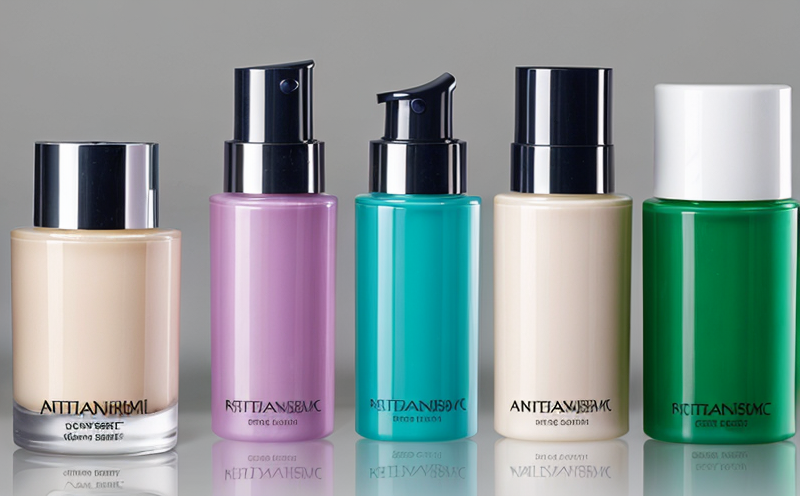Antimicrobial Effectiveness Testing in Cosmetic Distribution Studies
In the rapidly evolving world of cosmetics and personal care products, ensuring product safety is paramount. Antimicrobial effectiveness testing plays a critical role in safeguarding consumers from microbial contamination that could lead to skin irritation or infection. This service focuses specifically on evaluating the antimicrobial efficacy of preservatives used in cosmetic formulations through comprehensive distribution studies.
The objective of this service is to confirm that the selected preservative effectively inhibits the growth of microorganisms under real-world conditions, thereby enhancing product stability and shelf life. By simulating typical storage and usage scenarios, we provide robust data that supports regulatory compliance and consumer trust.
Our testing adheres strictly to international standards such as ISO 21778:2019, which outlines the procedures for evaluating antimicrobial efficacy in cosmetic products. This ensures consistency with global industry practices and acceptance by regulatory bodies worldwide.
- Testing Conditions: Replicates real distribution conditions including temperature variations, humidity levels, and potential contamination sources.
- Sample Preparation: Includes various concentrations of preservative to assess efficacy across different formulations.
- Data Collection: Utilizes microbiological techniques like colony-forming units (CFUs) and quantitative methods for precise quantification.
The service is designed to cater to quality managers, compliance officers, R&D engineers, and procurement teams within the cosmetics industry. By leveraging our expertise, clients can gain valuable insights into their product's antimicrobial performance, enabling informed decision-making regarding formulation changes or ingredient selection.
A key aspect of this testing involves understanding how different environmental factors influence microbial growth rates. For instance, higher temperatures generally accelerate bacterial activity, while lower humidity levels may favor fungal proliferation. By accounting for these variables in our studies, we ensure that the results accurately reflect expected performance under diverse conditions.
| Parameter | Description |
|---|---|
| Temperature Range | 4°C to 30°C |
| Relative Humidity | 25% to 75% |
| pH Level | 3.5 to 8.0 |
The above table outlines the standard test conditions employed during our antimicrobial effectiveness testing in cosmetic distribution studies. These parameters are selected based on typical storage and usage scenarios encountered by consumers, ensuring that the results are relevant and actionable.
Scope and Methodology
| Step | Description |
|---|---|
| 1 | Prepare test samples with varying concentrations of preservative. |
| 2 | Inoculate each sample with a known microbial challenge. |
| 3 | Incubate at controlled temperature and humidity levels for specified durations. |
| 4 | Monitor growth using quantitative microbiological methods. |
| 5 | Analyze data to determine efficacy against targeted microorganisms. |
The scope of this service encompasses a detailed evaluation of preservative performance in cosmetic products. The methodology involves preparing test samples with different concentrations of preservatives, inoculating them with specific microbial strains, and then incubating these under controlled environmental conditions. Growth is monitored over time using quantitative microbiological techniques to assess the effectiveness of each preservative.
This approach allows us to simulate real-world distribution scenarios accurately, providing clients with comprehensive insights into their product's antimicrobial properties. The use of standardized methods ensures consistency across tests and facilitates comparison between different formulations or batches.
Customer Impact and Satisfaction
The implementation of antimicrobial effectiveness testing in cosmetic distribution studies has significantly impacted various stakeholders within the industry. For manufacturers, it offers peace of mind knowing that their products meet rigorous safety standards before reaching consumers. Quality managers appreciate the detailed reports provided, which help them make informed decisions regarding ingredient selection and formulation adjustments.
- Enhanced Product Safety: By confirming preservative efficacy through real-world simulations, we minimize risks associated with microbial contamination.
- Improved Compliance: Our tests align closely with international standards, ensuring that your products are ready for global markets.
- Potential Cost Savings: Early identification of potential issues during development can lead to fewer product recalls and lower post-market costs.
Overall, our service contributes positively to the overall quality and reputation of cosmetic brands. Satisfied customers report higher levels of trust in their products' safety and efficacy, translating into increased brand loyalty and market share.
International Acceptance and Recognition
The growing importance of antimicrobial effectiveness testing underscores its relevance not just within the cosmetics industry but across various sectors. Regulatory bodies worldwide recognize the critical role this service plays in ensuring consumer safety and product integrity. Compliance with international standards such as ISO 21778:2019 is becoming increasingly mandatory for manufacturers aiming to penetrate global markets.
Our laboratory's expertise in antimicrobial effectiveness testing has been acknowledged by numerous national authorities and industry associations. This recognition not only enhances our credibility but also allows us to offer services that are universally accepted and trusted.





